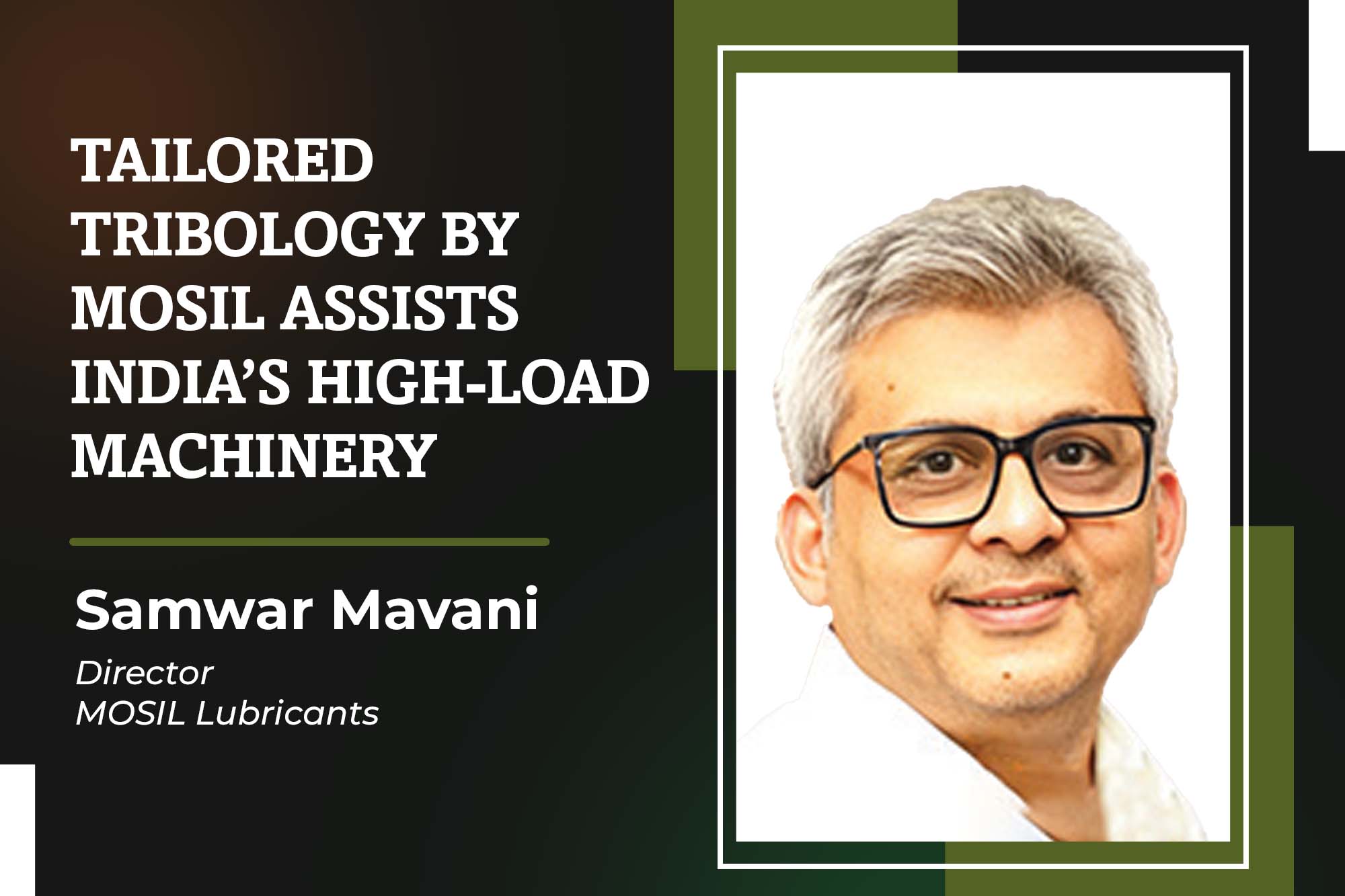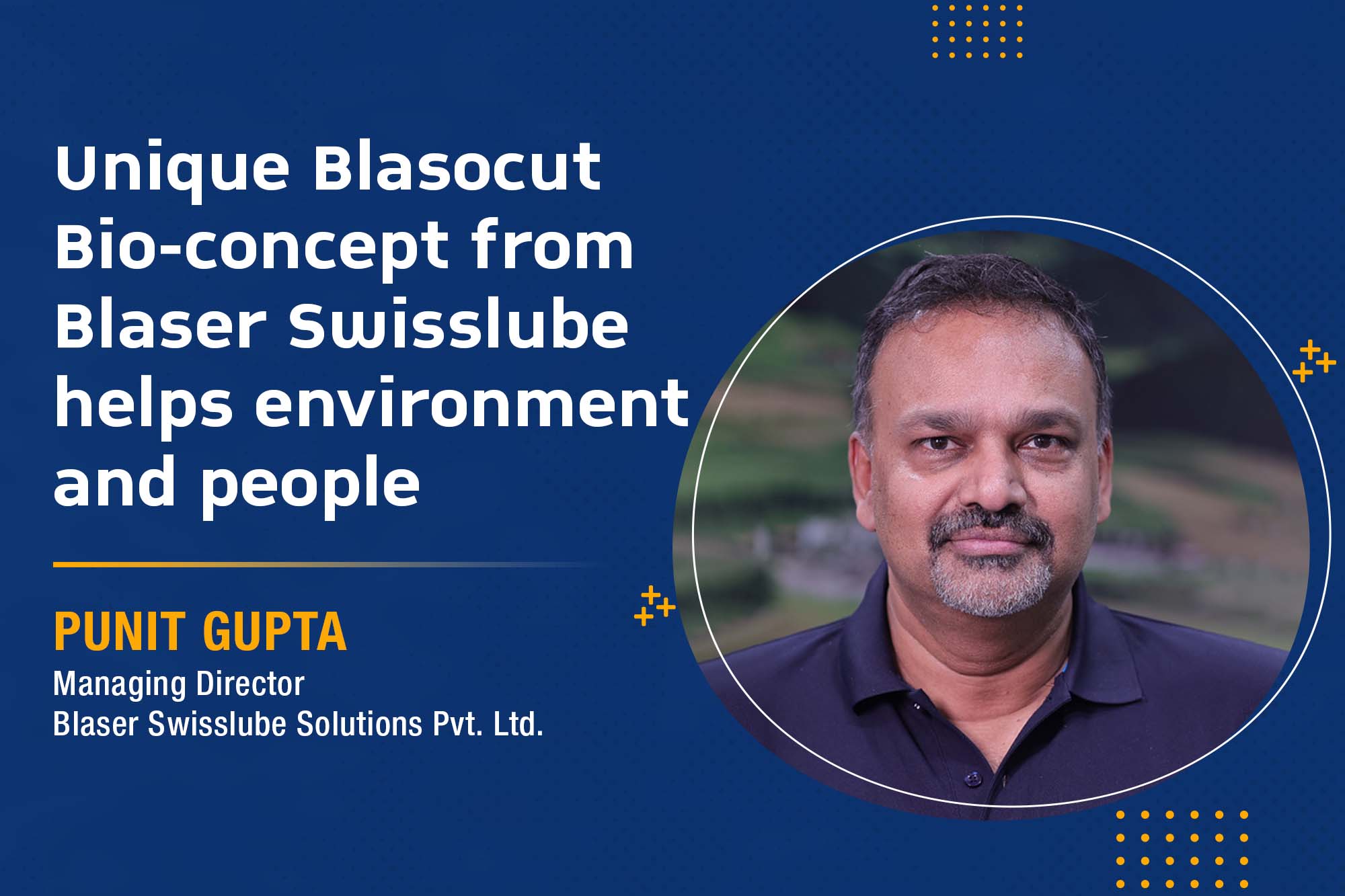Tailored tribology by MOSIL assists India’s high-load machinery
By Staff Report July 1, 2025 5:03 pm IST
Lubrication requirements evolve with changing market demands. Samwar Mavani, Director at MOSIL Lubricants, explains how the company continuously adapts its portfolio to stay ahead and shares his in-depth insights into the lubrication industry.
How do your lubricant solutions contribute to overall machine efficiency?
Approximately 50% of all mechanical failures stem from poor lubrication practices. MOSIL’s goal is to counteract this by tailoring solutions to extend equipment life, even under severe process and environmental limitations. Our approach is rooted in performance simulation, where we replicate the end-user application using custom-built test rigs. This simulates real-world load, temperature, speed and other environmental conditions before the product reaches the customer site.
Our lubricants have delivered measurable benefits. Beyond traditional applications, MOSIL’s solutions have shown improvements across a diverse range of industries. In robotic arms and automation systems, our low-friction ester-based greases have significantly reduced start-up torque and improved articulation, enhancing the precision and efficiency of servo-controlled joints. In the textile sector, our PAO-based high-speed spindle greases have enabled more stable operation at speeds exceeding 30,000 RPM, reducing bearing failures and enhancing yarn tension consistency. In thermal-intensive environments such as kiln cars and furnace fans, synthetic lubricants formulated with PFPE and silicone bases have doubled bearing life by maintaining integrity at temperatures above 280°C. Similarly, our high-temperature chain oils used in automotive and consumer durable industry paint shops have reduced lubrication frequency by up to 30% while minimising carbon residue buildup. Centralised lubrication systems in the cement and mining industries benefit from our pumpable, air-release optimised greases, ensuring consistent metered delivery to critical points. Even in highly regulated sectors like food and pharma, our NSF-H1-compliant greases combine safety with durability under washdown conditions. These results collectively demonstrate our commitment to delivering tailored lubrication strategies that reduce downtime, extend service life and unlock untapped machine efficiency across operationally demanding environments.
Are you seeing a shift toward synthetic or sustainable lubricants in the industry?
Our R&D teams have made substantial progress in formulating synthetic lubricants using PAOs, Esters, PFPEs and silicones, which demonstrate outstanding performance under high-speed, high-load and high-temperature conditions. These base fluids offer superior oxidation resistance, low volatility and better film strength compared to conventional mineral oil-based formulations.
Our synthetic greases and oils are being successfully deployed in robotic actuators, roller press bearings, paint shop chains, and kiln fan bearings, where conventional lubricants fail due to thermal degradation or mechanical instability. In one recent deployment at a leading steel plant in Eastern India, our speciality grease based on calcium sulfonate extended re-lubrication by over 80% in a pickling line bearing lubrication, directly contributing to increased equipment uptime and lower lubrication frequency.
Similarly, we are taking decisive steps to address the rising importance of sustainability and environmental stewardship. As global regulatory bodies tighten restrictions around lubricant toxicity and environmental persistence (such as PFAS-free formulations), biodegradable lubricants are becoming essential in sensitive applications, including hydropower turbines, municipal waste plants, textile dyeing units, and food processing conveyors. Although the current demand for biodegradable lubricants in India and Southeast Asia is modest, we expect this to evolve rapidly with a growing emphasis on ESG compliance, green procurement policies and increasing corporate accountability toward ecological impact.
MOSIL has already developed a suite of biodegradable lubricants formulated in alignment with ISO 15380 and tested under OECD 301 biodegradability protocols. These products are well-suited for applications where leakage into the environment is a risk, such as marine deck equipment and agricultural machinery. According to industry data, demand for biodegradable lubricants is expected to grow at over 5% CAGR globally, and we are positioning our portfolio to stay ahead of this curve.
What role does lubricant monitoring or condition-based maintenance play in your offerings?
Predictive maintenance is revolutionising industrial reliability, reducing equipment breakdowns by up to 70% and lowering maintenance costs by 25% or more. Lubrication plays a key role in this approach, which is why we offer a complimentary in-house oil and grease monitoring program for our customers. This program utilises advanced analytical tools, such as FTIR spectrometers to assess lubricant conditions and identify ageing indicators, and ED-XRF analysers to detect wear metals, providing early warnings of potential failures.
We also use rheometers and tribometers to simulate real-world conditions and test lubricants in extreme environments. For instance, our analysis for an automotive vendor showed no signs of deterioration in gear oil, saving ₹8 lakh by preventing unnecessary replacement. In another case, elevated silicon and iron levels in a cement plant’s gearbox oil indicated dust ingress, allowing timely maintenance before failure.
We are collaborating with digital technology providers to create a customer dashboard for integrating sampling reports, real-time alerts, and trend analysis. This lubrication analytics dashboard will support a full Condition-Based Maintenance (CBM) ecosystem, helping customers enhance asset longevity, improve uptime, and optimise maintenance schedules.
How are you helping manufacturers reduce downtime and maintenance costs?
Unplanned downtime is a significant challenge in modern manufacturing, costing industrial companies an estimated USD 50 billion annually due to lost productivity, scrapped output, and emergency repairs. Addressing this challenge requires delivering a lubrication solution engineered to pre-empt failure and reduce service interruptions.
Our proprietary Quadra Process is designed to do just that. It begins with understanding customer challenges and expectations and then developing a customised solution through application simulation. Our technical team replicates actual working conditions using industry-specific rigs, such as four-ball testers for EP behaviour, leakage testers for automotive hubs or temperature torque testers for mining conveyors. This is followed by custom formulation and product design, where we match the base oil, thickener and additive chemistry to the application’s thermal, mechanical, and environmental stresses.
Once a product is validated through lab and field trials, we proceed with application deployment and post-sale technical support, ensuring that the solution performs consistently over time. For instance, in the steel sector, we developed a calcium sulfonate grease for pickling line-bearing lubrication at a leading steel plant in Eastern India. It extended lubrication intervals from 8-10 days to over 20 days, contributing to over 40% reduction in downtime linked to lubrication failure.
Equally critical to our approach is empowering the customer’s internal teams. We conduct on-site training sessions and application workshops for maintenance, production and design engineering teams, helping them build knowledge in lubricant selection, re-lubrication frequency and contamination control. This enables customers to evolve from reactive service models to self-reliant, preventive maintenance regimes.
Are there specific formulations designed for high-speed or high-load machine tools?
Our product portfolio is built on a deep understanding of both tribological science and application-specific challenges. Our range spans multiple thickener systems, including Lithium, Lithium Complex, Calcium Sulfonate Complex, and Polyurea, which are formulated to meet distinct operational demands such as high load, water ingress, extreme temperatures, or long service intervals. These thickeners are combined with a diverse selection of base fluids, including mineral oils, PAOs, silicones, esters, polyol esters, and PFPEs, allowing us to design lubricants that are performance-matched to both the equipment and the operating environment.
For instance, our Calcium Sulfonate Complex grease, fortified with solid lubricants, has demonstrated weld load capacities exceeding 600 kgf in Four-Ball EP tests (ASTM D2596), making it an ideal choice for open gears, roller press bearings and continuous casters in the steel and mining industries. These greases also exhibit excellent water resistance (ASTM D1264) and mechanical stability (ASTM D1831), which are crucial for use in dusty, high-humidity environments.
In robotics and automation, we have developed synthetic ester-based greases with low starting torque and excellent oxidation stability, supporting high-precision actuators used in automated assembly lines and collaborative robots (cobots). One of our robotic customers reported a 22% improvement in actuator response time and a 30% reduction in re-lubrication intervals, resulting in significant productivity gains.
In pharmaceutical cleanrooms and packaging lines, where contamination is non-negotiable, we supply PFPE-based greases with extremely low vapour pressure and unmatched chemical resistance. These formulations meet NSF H1 and FDA 21 CFR 178.3570 requirements, maintaining stable lubrication performance across a temperature range of -40°C to +250°C. This ensures GMP compliance and reduces maintenance in granulators, blister packers, and vacuum pumps.
In addition to traditional heavy-duty sectors, we have developed specialised greases for high-speed textile spindles, ensuring stability above 30,000 RPM with minimal churning losses. We have also developed them for electrical motor bearings, where our low-noise greases help maintain smooth operation and reduce vibration-related inefficiencies.
All MOSIL lubricants undergo rigorous testing and validation according to global standards, including ASTM, DIN, and ISO, and are benchmarked against customer-specific testing protocols using our in-house jigs and tribological simulators.
Cookie Consent
We use cookies to personalize your experience. By continuing to visit this website you agree to our Terms & Conditions, Privacy Policy and Cookie Policy.
















